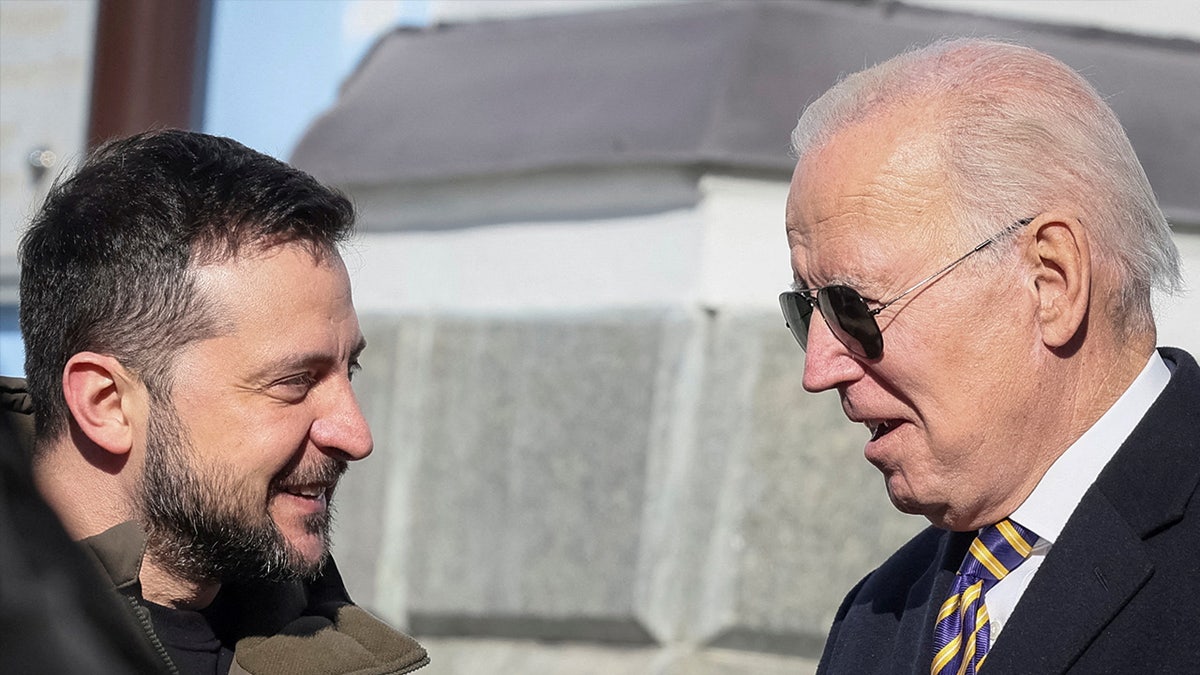Sen. Roger Marshall on Senate border negotiations
Sen. Roger Marshall discussed the crisis at the southern border and Senate negotiations in an exclusive interview with Fox News Digital.
Sen. Roger Marshall, R-Kansas, is one of several dissatisfied Republicans who voted against the multibillion-dollar national security supplemental package early Tuesday morning because it did not include any border security provisions.
Marshall now hopes House Speaker Mike Johnson, R-La., can finish what a handful of Senate Republicans hoped to achieve in the Democrat-controlled chamber: securing the southern border before aid is sent to overseas allies.
The Senate shot down a package that included border-related provisions early last week, saying it was "hardly" border security at all, and instead urged the Senate to take up the House's border policy, known as H.R. 2, which includes Trump-era restrictions and stricter screenings for asylum claims.
"I would love to see Speaker Johnson take H.R. 2 and add it to the bill that we passed," Marshall told Fox News Digital in an interview Tuesday. "I think that's something that a super majority of Republicans could support."
Marshall said he was not happy with the Senate's passage of some $60 billion to Ukraine because of several instances of inadequate auditing of funds, but he said he is "willing to trade that in return for meaningful border security" if the House decides to attach Ukraine aid to their bill.
Both Sen. Majority Leader Chuck Schumer, D-N.Y., and Sen. Minority Leader Mitch McConnell, R-Ky., voted in favor of the foreign aid package.
SENATE PASSES CONTROVERSIAL FOREIGN AID BILL SENDING BILLIONS TO UKRAINE, ISRAEL, AND TAIWAN

Kansas Sen. Roger Marshall holds stacks of money as he speaks during a press conference on inflation, at the Russell Senate Office Building on Feb. 16, 2022 in Washington, D.C. (Photo by Kevin Dietsch/Getty Images)
"Many of us are horribly disappointed there was no border security in this package," Marshall said. "It was a very closed process." Neither Republicans nor Democrats could reach an agreement on bringing several filed amendments to the floor for debate, so the package passed without them.
"More than half of the Republican caucus did not support this bill," Marshall continued. "And that's why it's not going to fly in the House. Speaker Johnson is not going to bring something to the floor, unless he has the majority of the majority."
Johnson has already made it clear the House would not take up the Senate's foreign aid bill in a statement on Monday, but instead, would draft their own bill with border security provisions included. It is unclear if the House's aid package would include assistance to Ukraine.
"The mandate of national security supplemental legislation was to secure America’s own border before sending additional foreign aid around the world," Johnson said. "It is what the American people demand and deserve. Now, in the absence of having received any single border policy change from the Senate, the House will have to continue to work its own will on these important matters. America deserves better than the Senate’s status quo."
U.S. NATIONAL DEBT TRACKER: SEE WHAT AMERICAN TAXPAYERS (YOU) OWE IN REAL TIME

Senate Majority Leader Chuck Schumer, left, and Senate Minority Leader Mitch McConnell. (Getty Images)
Sen. Lindsey Graham, R-S.C., a usual proponent of foreign defense spending, also voted against the package, arguing that helping Ukraine, Israel and Taiwan "makes sense, but not this way."
"America’s border is a disaster. We are $34 trillion in debt. It is time to help our allies while also helping ourselves," he said in a statement. Graham said the bill is "rightly DOA in the House" and signaled support for former President Trump's proposal to make the foreign assistance a loan.
In a Truth Social post earlier this week, Trump said, "THE DEAL SHOULD BE (CONTINGENT!) THAT THE U.S. IS HELPING YOU, AS A NATION, BUT IF THE COUNTRY WE ARE HELPING EVER TURNS AGAINST US, OR STRIKES IT RICH SOMETIME IN THE FUTURE, THE LOAN WILL BE PAID OFF AND THE MONEY RETURNED TO THE UNITED STATES. WE SHOULD NEVER GIVE MONEY ANYMORE WITHOUT THE HOPE OF A PAYBACK, OR WITHOUT 'STRINGS' ATTACHED. THE UNITED STATES OF AMERICA SHOULD BE ‘STUPID’ NO LONGER!"
The Senate passed the $95 billion national security supplemental package to assist Ukraine, Israel and the Indo-Pacific after a tedious procedural process that came to an end early Tuesday morning after GOP lawmakers spent hours filibustering it.
PENTAGON FINALLY RUNS OUT OF MONEY FOR UKRAINE, URGES 50 ALLIES TO CONTINUE SUPPORTING KYIV

President Biden, right, and Ukrainian President Volodymyr Zelenskyy visit Saint Michael’s cathedral amid Russia's attack on Ukraine, in Kyiv, Ukraine Feb. 20, 2023. (REUTERS/Gleb Garanich)
In a press conference Tuesday morning, Schumer praised the package as "one of the most historic and consequential bills" to ever pass in the upper chamber.
"The responsibility now falls on Speaker Johnson and House Republicans to approve this bill swiftly," Schumer said. "And I call on speaker Johnson to rise to the occasion to do the right thing."
CLICK HERE TO GET THE FOX NEWS APP
The final vote was 70 to 29, with 22 Republicans voting yes. Democratic Sens. Peter Welch and Jeff Merkley, plus independent Sen. Bernie Sanders, voted no.
The supplemental package comes as the national debt soars above $34 trillion. Calls to offset the spending with cuts elsewhere went unheeded. Several Republicans spent hours — since the beginning of the weekend — collectively filibustering the package on the Senate floor. Sen. Mike Lee, R-Utah, committed to filibustering the bill for four hours on Saturday and continued early Tuesday.
The package includes $60 billion for Ukraine, $14 billion for Israel, $9 billion in humanitarian assistance for Gaza and nearly $5 billion for the Indo-Pacific. Democrats brought the package up for a vote after Republicans last Wednesday blocked the $118 billion package that included numerous border and immigration provisions, which had been negotiated by a bipartisan group of senators and Biden officials.





